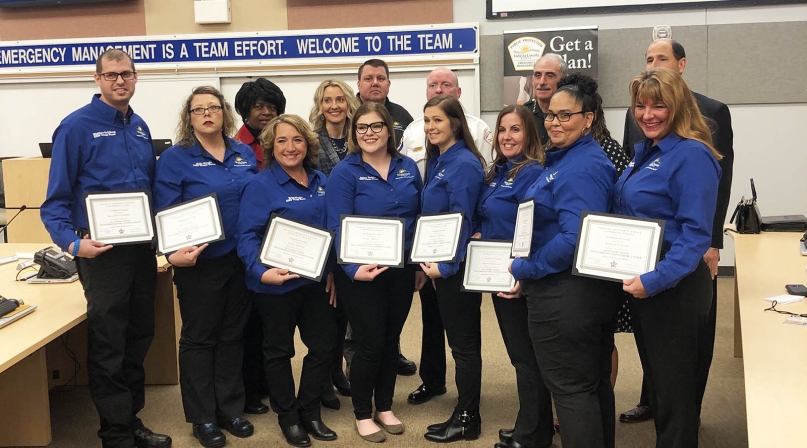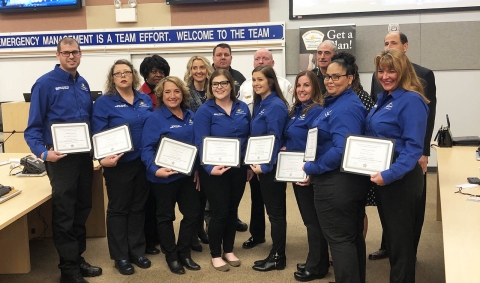Florida county nurse program streamlines ambulance service
Author
Upcoming Events
Related News

Volusia County, Fla., launched a new program that is saving time, money and county resources by reducing the use of emergency resources for non-emergency 911 calls.
The E-911 Redirect Nurse Triage program started as part of a strategic plan for budget improvements to better utilize facilities and resources in the county with the help of triage nurses working with callers that may have non-urgent medical situations.
Similar to other areas across the country, Volusia County’s 911 dispatchers receive non-urgent calls that leave emergency vehicles sidetracked when other callers have life-threatening situations. According to EMS Medical Director Peter Springer, Volusia County EMS receives around 67,600 calls to 911 per year with 50,000 of those callers requiring EMS transport. The difference of roughly 17,600 calls requires units to be dispatched to evaluate a caller’s situation but does not result in transportation to the hospital.
“We’ve done as an industry a great job of promoting 911 and unfortunately we’ve done such a great job that we’ve kind of flooded the 911 dispatch centers with a lot of non-emergency calls,” Springer said.
Since the program launched Dec. 9, lead EMS Triage Nurse Pam Cawood explained, 911 dispatchers now determine if a caller’s situation is a true emergency. If the situation is deemed severe, the caller will never speak to a triage nurse and the dispatcher will immediately send emergency vehicles. If the dispatcher determines a call is non-urgent, they transfer the caller to the nurse triage line. Non-severe situations include flu-like symptoms, backaches, rashes, mild allergic reactions, mild cuts, abrasions and common cold symptoms, Cawood said.
When being transferred, the caller is never put on hold. After connecting to a triage nurse, the nurse asks specific questions about the caller’s medical condition and uses a list of protocol question sets that were created by the medical director of the county and the triage nurses. The nurses use the question sets to recommend treatment and resources for the caller.
The county hired seven part-time nurses in addition to Cawood. Each nurse has FEMA certification, emergency department experience and triaging experience.
Their experience also includes completing training to be Florida state-certified telecommunicators to dispatch ambulances, law enforcement, fire and medical.
“Between the eight of us, we have over 100 years of nursing experience,” Cawood said. “We’re highly skilled, highly trained, well-experienced nurses.”
The Volusia County Sheriff’s Office held the training for the nurses to become certified telecommunicators.
Training Coordinator Debbie Rego taught the nurses the material during 280 hours of telecommunication training. This is the same training 911 dispatchers receive.
There are four different levels of treatment that triage nurses use, varying from dispatching an ambulance, which nurses are able to do because of the telecommunication certification, to providing home care instructions or asking callers if a friend, relative or neighbor can provide them transportation to an emergency department.
If the nurse determines a caller should be seen by a medical professional within 24 hours, they ask callers if they can see their primary care physician or visit an urgent care clinic. Triage nurses are able to call ahead to offices and urgent care locations to let them know a patient is coming.
“We have partnerships with most of the quick care clinics, urgent care centers in Volusia County and they are expecting our phone calls,” Cawood said.
She emphasized if a caller insists on an ambulance, they will always dispatch one.
“We always triage up and when in doubt, we always dispatch an ambulance,” she said.
For callers who are not sent an ambulance, the triage nurses complete “callbacks” within 24 to 72 hours of the initial call to follow up with the caller.
Volusia County created their own software for the program with the help of the IT department in the Emergency Operations Center instead of purchasing a third-party software. The system allows nurses to create files within the software that can store a patient’s medical record.
Currently, the nurse triage line is available Monday through Friday from 7 a.m. to 7 p.m. Cawood said they are tracking the hours of their calls and may alter their hours in the future.
Since the program has launched, Springer said the nurse triage line is receiving about 15 calls on average per day.
“The benefit for patients is we’re going to try to find places for them to be seen and treated that are most appropriate for what they’re calling for,” he said.
Springer and Cawood both stressed the importance of collaborating with other departments to launch the E-911 Redirect Nurse Triage program. The program is a collaboration of the Human Resources department, the sheriff’s office, the Emergency Operations Center, area hospitals, urgent care clinics, health departments and other community partners.
Washington D.C., Las Vegas, Nev.; Reno, Nev.; Fort Worth, Texas and Richmond, Va. have all implemented similar nurse triage programs for 911.
“You have to make sure that people understand that this is a positive thing for the community,” Springer said. “…Not only are the citizens benefiting from it, but so is the system as a whole.”

Attachments
Related News

Drug tracking software helps counties identify trends, save lives
Florida counties are using an artificial intelligence tool called Drug TRAC to track and report drug trends, with the aim of providing quicker outreach and saving lives.

White House Executive Order establishes national substance use disorder response
On January 29, the White House issued an Executive Order (EO) establishing the Great American Recovery Initiative, a new federal effort aimed at coordinating a national response to substance use disorder (SUD).

USDA and HHS release new dietary guidelines
On January 7, U.S. Department of Agriculture Secretary Brooke Rollins and U.S. Department of Health and Human Services Secretary Robert F. Kennedy, Jr. unveiled the new Dietary Guidelines for Americans, 2025–2030.
